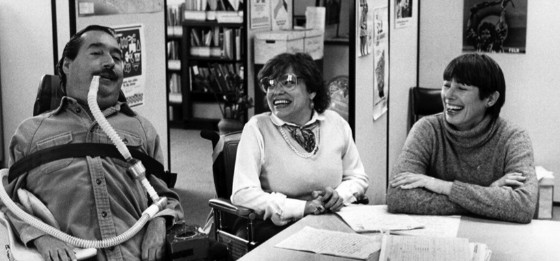Celebrating the Past and Fighting for the Future of the Independent Living Movement
When Judith Heumann met Ed Roberts, founder of the Independent Living Movement, she was in New York working with Disabled In Action, the civil rights organization she founded to fight discrimination against the disability community. At the time, Disabled In Action was involved with a variety of issues, all with the goal of advancing disability rights as a civil rights issue, according to Heumann.
“Ed and I were close friends from the time that we spoke on the phone,” says Heumann, who moved to Berkeley, California, and co-founded the Center for Independent Living at the University of California, Berkeley with Roberts. Heumann describes this time as a tipping point for the disability community, when disabled activists began collectively fighting for disability rights as a civil rights issue. Previously, society considered disability primarily from the medical model, and treated it as an problem that needed a cure. “There were disabled people who really wanted to come together and work across disability perspectives, and wanted to be able to be loud and proud and constructive in enforcing policy change,” Heumann remembers. “And at the same time, it was an opportunity for people to come together. It was very empowering.”
Heumann describes it as a time when disability activists had their pick of disability rights issues to work on—everything from fighting institutionalization, to pursuing education reform, to combatting sheltered workshops—and there were no national or state laws preventing discrimination of disabled people. There was no Americans with Disabilities Act, public transportation wasn’t accessible, and there were thousands of disabled children not in school. “It was an important time for people to realize that we needed to take our power,” explains Heumann.
Along with other activists, Ed Roberts formed the Rolling Quads group and fought for UC Berkeley to create a Disabled Students Program, a resource for students with disabilities that was run by students with disabilities. Heumann says that she, Roberts, and other Independent Living advocates fought for community members to be able to use UC Berkeley’s disabled students resources as well. All of this work culminated in the start of the first Independent Living center, the Berkeley Center for Independent Living. And now, in recognition of Ed Roberts’ legacy, we celebrate Ed Roberts Day each year on his birthday, the 23 of January.
The Independent Living Movement has since shifted to fit the evolving needs of the disability community and keep up with advancements in policy, technology, and social attitudes. In a Storytellers video for Rooted in Rights, Alex Ghenis, a disability rights activist and policy specialist from Berkeley, California, spoke about the legacy of UC Berkeley’s Disabled Students Residence Program, the modern day equivalent of Ed Roberts’ work on campus in the 1970s. The university closed the DSRP, and according to Ghenis, has not fully reinstated it, despite ongoing pressure from student activists.
“The DSRP and similar programs are also important in that they can teach personal empowerment around independent living, and instill a strong positive disability identity,” says Ghenis. There are many challenges that people with disabilities face to live independently, including finding and hiring personal care assistants, receiving medical care, and balancing school and/or employment with other daily needs. The DSRP helped bridge that gap, and provided the necessary resources to make the transition to independent living as smooth as possible.
One of the challenges of independent living programs is that they requires a combination of adequate funding and financial support, government services, access, and accommodations. “All of these require resources of some sort, and it takes vigilance to get those resources and keep them long-term,” explains Ghenis, who recommends that activists and coalitions continually strategize how to fight for the resources needed, whether through direct action, political organizing, or public messaging. Innovation, whether it happens in policy or technology, can make it easier to provide necessary resources, and activists need to continue creating progressive ideas that push the movement forward.
Both Heumann and Ghenis feel that we’re in a particularly difficult time for the Independent Living Movement.
Although there have been decades of progress around the expansion of public access, equality, and benefits such as financial assistance, health care, and independent living supports, there is currently significant pushback from small-government and fiscal conservatives to reduce benefits and make them more difficult to manage.
“The Independent Living Movement simply has to push back against the repeal of so much it has fought for in the first place,” Ghenis says, citing examples like the new Electronic Visit Verification (EVV) systems that jeopardize people with disabilities’ independence and privacy, and may eventually lead to a loss of personal care and the need to live in institutions.
“Now it’s not whether we can make advancements, but we’re needing to make advancements at the same time as we’re fighting to make sure advancements we have already made are not taken away from us,” says Heumann, who mentioned health care as a prime example of how the disability rights movement is expending a lot of energy fighting against the repeal of rights that were previously won.
The Independent Living Movement is something we will need to continue to fight for. But it’s important that we do celebrate the collective and individual wins of our community, and honor activists the way we do with Ed Roberts Day. As Heumann remembers him, Ed Roberts was a man who empowered the disability community by showing others that they could accomplish what he did, and that anyone can be an activist. “Ed Roberts Day honors a man who was so central to its progress,” says Ghenis, “and also reminds us of the power of individual activists to continue the fight.”
The Threatened Legacy of Independent Living with Alex Ghenis
About Rooted In Rights
Rooted in Rights exists to amplify the perspectives of the disability community. Blog posts and storyteller videos that we publish and content we re-share on social media do not necessarily reflect the opinions or values of Rooted in Rights nor indicate an endorsement of a program or service by Rooted in Rights. We respect and aim to reflect the diversity of opinions and experiences of the disability community. Rooted in Rights seeks to highlight discussions, not direct them. Learn more about Rooted In Rights



